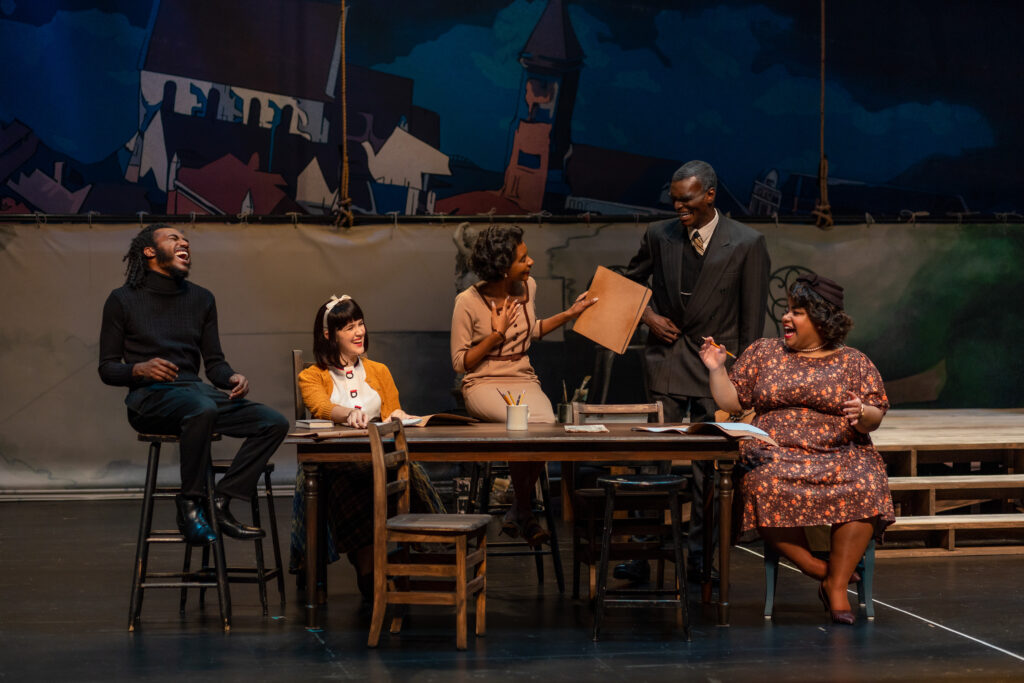
BFA Acting and/or Linehan Acting Audition Guidelines
Audition Requirements (both virtual and in person):
- Freshmen and/ or Linehan: Prepare one 60-90 second contemporary monologue (comedic or dramatic).
- Transfer: Prepare two, contrasting, 60-90 second monologues (no more than 3 minutes all together). The pieces may be either comedic or dramatic, contemporary or classical.
Ideally, your audition monologue should feature material you feel connected to and excited to perform. It’s helpful if the monologue is from a published play, but not required.
Virtual BFA Acting Auditions are to be completed live over Zoom (no audition tapes submitted beforehand); the audition link will be sent to your email after registration. In person BFA Acting Auditions and Linehan Acting Auditions will take place on campus, in person, in the Performing Arts and Humanities Building (PAHB). The room number will be sent to your email after registration.
Immediately following your audition, you may complete a brief interview with the faculty. Interview questions can be found below.
Linehan Portfolio Review Guidelines
Portfolio Requirements
***Please note – A portfolio review is only necessary for students pursuing the Linehan Artist Scholars Program (who are not completing an acting audition) . If you intend on pursuing B.A. Theatre; Design & Production, B.A. Theatre; Theatre Studies, or B.A. Theatre; Theatre Education – no portfolio review is necessary.
Prepare a digital portfolio of visual material that represents your theatre work. We recommend you prepare this using Google Slides, with any appropriate links made live in the document. You will present this digital portfolio to the faculty live and in person on Linehan Audition and Portfolio Review Day.
Please add Katie Hileman (hikat1@umbc.edu), Adam Mendelson (am@umbc.edu), and Eric Abele (abele@umbc.edu) as VIEWERS of your portfolio. Make sure the title of your portfolio is LAST NAME – LINEHAN PORTFOLIO. Portfolios will be due at least one day prior to review day, so that faculty may have access to your materials for your presentation.
You are welcome (and encouraged!) to bring items in person to supplement your digital portfolio.
The portfolio can include any of the following:
- Photographs of Productions: No matter your job, large and clear photographs of the set, theatre, performance venue, etc., help us see the scale of the show and its inherent storytelling.
- Unrealized Class Projects. Drawings, renderings, light plots, costume sketches, fabric swatches, etc. for shows you did in class, for yourself, or for any after-school program. These should all be clearly labeled with the show title and playwright.
- Side Projects: Cosplay, church, and event work, even non-theatre, are good to include.
- Paperwork Samples: Paperwork is vitally important to your process! This could include stage management scripts or prompt books, action charts, budget, marketing plans, logos, or anything you generated to communicate for your production.
- Audio or Video Clips: If your design area is in sound or media, then install links to YouTube or SoundCloud to share your work so that we may experience it.
How much should I include in my portfolio?
- There’s no right or wrong answer, but make sure you can share your work in 5-7 minutes
- Put your absolute best work first, however you define it, so you’re sure to share your most awesome self; then add in your remaining work
- You don’t have to share everything. We’re not necessarily looking for artists with lengthy resumes, rather artists who have made interesting and compelling choices with the experiences they have had.
Immediately following your portfolio review, you may complete a brief interview with the faculty. Interview questions can be found below.
Interview Questions
After your monologue, or portfolio review, the faculty may ask you the following questions. There’s no need to prepare scripted answers; the purpose of this interview is to get to know your interests as a theatre artist. It’s meant to be casual, and an opportunity to get to know you better!
- Why are you interested in the UMBC Department of Theatre?
- Choose one of your recent roles/performances OR production/class experiences. What did you learn about yourself both as an artist and as a person from working on this process?
- In addition to acting/performance OR design/production/stage management, what are your other academic and artistic areas of interest?
- When you see yourself working in your craft, where is that?
- What other colleges are you looking at?